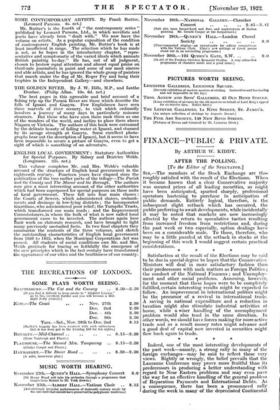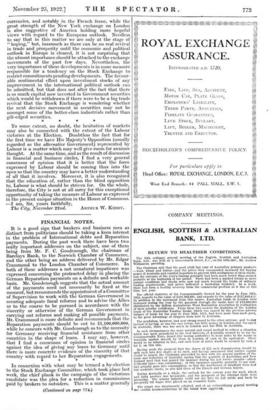FINANCE-PUBLIC & PRIVATE.
By ARTHUR W. KIDDY.
AFTER THE POLLING. [To the Editor of the SPECTATOR.] SIR,—The members of the Stock Exchange are tho. roughly satisfied with the result of the Elections. Wien it became known that a clear Conservative majority was secured prices of all leading securities, as might have been anticipated, spurted sharply, professional operators hastening to purchase in anticipation of public demands. Entirely logical, therefore, is the subsequent slight setback which has occurred, the public preferring to await developments, while incidentally it may be noted that markets are now increasingly affected by the return to speculative tactics resulting from increased freedom from restrictions and, during the past week or two especially, option dealings have been on a considerable scale. To those, therefore, who may be a little puzzled at the setback in stocks at the beginning of this week I would suggest certain practical considerations.
Satisfaction at the result of' the Elections may be said to be due in special degree to hopes that the Conservative Ministers will deal in more satisfactory fashion than their predecessors with such matters as Foreign Politics ; the conduct of the National Finances ; and Unemploy- ment and other social problems. Assuming, however, for the moment that these hopes were to be completely fulfilled, certain interesting results might be expected to follow. An improvement in international politics might be the precursor of a revival in international trade. A saving in national expenditure and a reduction in taxation might also stimulate industrial activities at home, while a wiser handling of the unemployment problem would also tend in the same direction. In other words, we should have forces making for more active trade and as a result money rates might advance and a good deal of capital now invested in securities might flow back again to trade.
* * * * Indeed, one of the most interesting developments of the past week—namely, a strong rally in many of the foreign exchanges—may be said to reflect these very views. Rightly or wrongly, the belief prevails that the Lausanne Conference may prove more fruitful than its predecessors in producing a better understanding with regard to Near Eastern problems and may even pave the way for an effective handling of the general problem of Reparation Payments and International Debts. As a consequence, there has been a pronounced rally during the week in many of the depreciated Continental
currencies, and notably in the French franc, while the great strength of the New York exchange on London is also suggestive of America holding more hopeful views with regard to the European outlook. Needless to say that in this matter we are only at the stage of " hoping," but, inasmuch as there can be no real revival in trade and prosperity until the economic and political outlook in Europe is cleared, it is not surprising that the utmost importance should be attached to the exchange movements of the past few days. Nevertheless, the very importance of these developments is in some measure responsible for a tendency on the Stock Exchange to restrict commitments pending developments. The favour- able sentimental effect upon investment stocks of any improvement in the international political outlook can be admitted, but that does not alter the fact that there is so much capital now invested in Government securities which would be withdrawn if there were to be a big trade revival that the Stock Exchange is wondering whether the next decisive movement in securities may not be amongst some of the better-class industrials rather than gilt-edged securities.
* * * *
To some extent, no doubt, the hesitation of markets may also be connected with the extent of the Labour
victories at the Election. Doubtless the fact that for the first time we have His Majesty's Opposition (usually regarded as the alternative Government) represented by Labour is a matter which may well give room for anxious thought. At the same time, and as the result of discussion in financial and business circles, I find a very general consensus of opinion that it is better that the force expressed by Labour should be coming thus into the open so that the country may have a better understanding of all that it involves. Moreover, it is also recognized that the education of, rather than the blind opposition to, Labour is what should be striven for. On the whole, therefore, the City is not at all sorry for this exceptional opportunity of taking the measure of Labour as expressed in the present unique situation in the House of Commons. —I am, Sir, yours faithfully, The City, November 22nd. ARTHUR W. KIDDY.











































 Previous page
Previous page